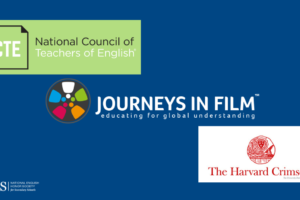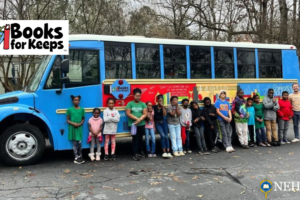Eat and Read started at Melba’s Po’Boy Shop, a beloved community restaurant, located in New Orleans’ seventh ward neighborhood. The neighborhood is 73% African American with 50% of residents living at or below the national poverty threshold of $25,000 annual income (The Data Center). In Louisiana, we are experiencing a literacy crisis with over 40% of children reading below grade level and 1 in 4 adults functionally illiterate. People in Louisiana want to read. Every adult literacy program in New Orleans has a waitlist. Eat and Read believes that access to literacy should not be limited to classrooms, libraries, or book stores. We provide books for children and community members in the space that they already gather, the po’boy shop.
Eat and Read brings literacy to the people by putting books in their hands and introducing authors to communities. Eat and Read Literacy Project has given away over 20,000 books since 2019 and hosted over 160 authors ranging from Harvard professors to self-published community members with a great story to tell! When an author visits Melba’s for a book event, Eat and Read purchases 100 copies of their book to give away for free to anyone who comes to the event. Many community members have become regular attendees of book events and report having filled entire bookshelves with the books that they have gotten for free from Eat and Read. Eat and Read events are transformative experiences for restaurant staff, community members, and authors. Each new reader inspires a family and transforms our communities one book at a time.
With support from NEHS, Eat and Read Literacy Project was able to purchase books for our new book vending machine, which offers free children’s books to anyone in our community. Every child that enters Melba’s is able to get a free book from the vending machine. With support from NEHS, Eat and Read has purchased 500 books to give to children for free.
In the short term, the Eat and Read vending machine provides books for children and their families to enjoy. A study from Ohio State University found that children who are read to five times daily will hear nearly 1.5 million words by the time they turn 5—boosting their language development and setting a strong foundation for school success. In the long term, Eat and Read is helping to cultivate a love of reading in communities that are often neglected by the educational system and publishing industry. Eat and Read events provide access to books, authors, and information for members of our community who may not otherwise have access to a book event in a more traditional location like a college campus or bookstore. Eat and Read programs take place within the familiarity of a community restaurant where people already gather.
Funding from NEHS not only resulted in tangible community impact by putting books in the hands of children and community members, but also helped demonstrate external support for our mission and inspire other foundations to support Eat and Read to expand and grow.
 Jane Wolfe is the Director of Melba’s and its Eat and Read Literacy Project. She works to create a culture of literacy in the restaurant industry by hosting author events and putting books in the hands of people. Readers in her community are able to engage with the transformative ideas of our generation as professors and thought leaders bring their research and artistry from the ivory tower to the community kitchen. Her program seeks to inspire a love of reading in communities neglected by the publishing industry and educational systems.
Jane Wolfe is the Director of Melba’s and its Eat and Read Literacy Project. She works to create a culture of literacy in the restaurant industry by hosting author events and putting books in the hands of people. Readers in her community are able to engage with the transformative ideas of our generation as professors and thought leaders bring their research and artistry from the ivory tower to the community kitchen. Her program seeks to inspire a love of reading in communities neglected by the publishing industry and educational systems.
National English Honor Society
The National English Honor Society (NEHS), founded and sponsored by Sigma Tau Delta, is the only international organization exclusively for secondary students and faculty who, in the field of English, merit special note for past and current accomplishments. Individual secondary schools are invited to petition for a local chapter, through which individuals may be inducted into Society membership. Immediate benefits of affiliation include academic recognition, scholarship and award eligibility, and opportunities for networking with others who share enthusiasm for, and accomplishment in, the language arts.
America’s first honor society was founded in 1776, but high school students didn’t have access to such organizations for another 150 years. Since then, high school honor societies have been developed in leadership, drama, journalism, French, Spanish, mathematics, the sciences, and in various other fields, but not in English. In 2005, National English Honor Society launched and has been growing steadily since, becoming one of the largest academic societies for secondary schools.
As Joyce Carol Oates writes, “This is the time for which we have been waiting.” Or perhaps it was Shakespeare: “Now is the winter of our discontent made glorious summer . . .” we celebrate English studies through NEHS.
National English Honor Society accepts submissions to our blog, NEHS Museletter, from all membership categories (students, Advisors, and alumni). If you are interested in submitting a blog, please read the Suggested Guidelines on our website. Email any questions and all submissions to: submit@nehsmuseletter.us.













